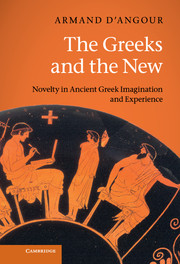Book contents
- Frontmatter
- Contents
- Acknowledgements
- Introduction
- Chapter 1 New, new, new
- Chapter 2 Loosening the grip of the past
- Chapter 3 The transformations of Kaineus
- Chapter 4 Old and new
- Chapter 5 Nothing new under the sun
- Chapter 6 The birth of Athena
- Chapter 7 Inventions of Eris
- Chapter 8 The newest song
- Chapter 9 Constructions of novelty
- Chapter 10 So what's new?
- References
- General index
- Index of Greek terms
- Index locorum
- References
Chapter 7 - Inventions of Eris
Published online by Cambridge University Press: 07 September 2011
- Frontmatter
- Contents
- Acknowledgements
- Introduction
- Chapter 1 New, new, new
- Chapter 2 Loosening the grip of the past
- Chapter 3 The transformations of Kaineus
- Chapter 4 Old and new
- Chapter 5 Nothing new under the sun
- Chapter 6 The birth of Athena
- Chapter 7 Inventions of Eris
- Chapter 8 The newest song
- Chapter 9 Constructions of novelty
- Chapter 10 So what's new?
- References
- General index
- Index of Greek terms
- Index locorum
- References
Summary
He that will not apply new remedies must expect new evils; for time is the greatest innovator.
Francis Bacon‘Innovation’ in the modern world is primarily associated with the products of technology and consumerism. The design and development of new goods and services, the constant evolution of new technologies of production and delivery, are crucial to the success of corporations large and small. While the drive to innovate may arise from necessity, individual impulse or pure experimentalism, corporate innovation is most commonly linked to the demands of competition: ‘radical innovation is the competitive advantage for the new millennium’. In science, medicine and the arts, innovation is intensified and encouraged by public incentives and private rewards. The imperative extends across fields both popular and esoteric – fashion design no less than military and information technology, popular music and media, education and academia. Born of ceaseless competition, innovative products and inventions impinge on the lives and consciousness of individuals with relentless rapidity. The idea that inventions come ‘out of the blue’ is a persistent myth; innovation in most areas tends to owe less to inspirational genius than to small, painstaking improvements in products, designs and techniques. But although novelties generally arise from deliberate, controlled processes and incremental advances, to the observer and consumer they can seem radical and sometimes epiphanic.
The ethos of competition in ancient Greece led Jakob Burckhardt to characterise the archaic epoch as ‘agonal’. Notions of competitiveness are prominent in the foundational texts of Greek literature. In Homer, warriors compete in excellence (aretē) and for commemorative glory (kleos) on the battlefield and in athletic events, gods compete for honour (timē) and gratification (kharis), rivals strive to outdo each other in strength, speech and cunning. Competition is not only the prerogative of emulous heroes and contentious divinities; dancers, craftsmen and bards also seek to impress and win rewards for their skills.
- Type
- Chapter
- Information
- The Greeks and the NewNovelty in Ancient Greek Imagination and Experience, pp. 162 - 183Publisher: Cambridge University PressPrint publication year: 2011

